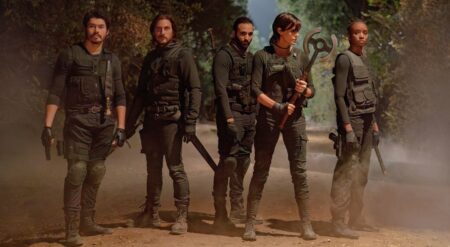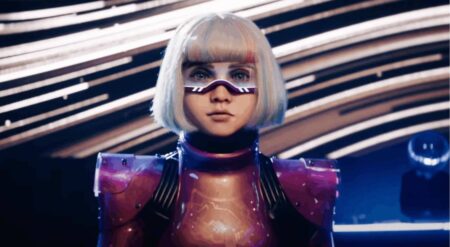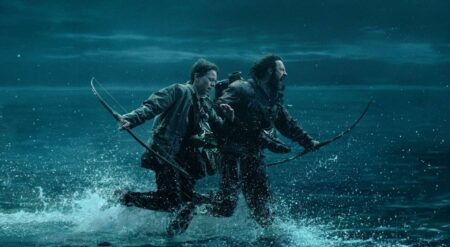A cinematic reimagining of James O’Barr‘s 1989 graphic novel The Crow has been in development for decades. With everyone from Bradley Cooper to Jason Momoa tapped to star. Among numerous directors like Blade‘s Stephen Norrington looking to take the reins, it seemed as if the project would never get off the ground. Ignoring its mostly obscure sequels (The Crow: City of Angels has its prominent defenders, at least), another film adaptation of The Crow has difficulty stepping out of the shadow of the initial 1994 adaptation.
Famous just as much for its now-iconic sensibilities as the on-set tragedy that befell star Brandon Lee, that film was never the blueprint for 2024’s The Crow. Today’s The Crow reimagines the classic story, centering pain and tragedy in a moody, romantic thriller that, despite prominent messy elements, has a gothic heartbeat worth listening to.
Directed by Rupert Sanders (Ghost in the Shell, Snow White & The Huntsman), The Crow opens with a discomforting image. As a child, Eric Draven witnesses his horse bleeding out, snagged on barbed wire as his mother lies asleep, intoxicated. Flash forward to the present day. Eric (Bill Skarsgård), tattooed and clearly fighting demons, resides in a rehabilitation center. Bill Skarsgård is a far cry from the lively musician Eric Draven audiences met at the beginning of ’94’s The Crow. He’s introverted, punishing himself for not being strong enough to face the days. It’s a fresh take on the character that is only strengthened by the arrival of fellow patient Shelly Webster (FKA Twigs).
Ostensibly there for drug problems, Shelly immediately takes to Eric. Both of them are “brilliantly broken,” as Shelly says, and find in each other an escape. As they escape to the sounds of Joy Division’s “Disorder,” The Crow begins to come into its own. Bill Skarsgård and FKA Twigs have intense chemistry, physical and emotional. Seeing two people, beaten down by the world, become junkies for each other’s love rings true.
Clinging to one another under the strobe lights of a nightclub, Eric setting his poetry to Shelly’s music, bathing together, Eric and Shelly are the sexy gothic romantic ideal—a shared light in a cruel world. When the two are sitting on a bridge in the dead of night, wondering if some angsty kids would memorialize them if they jumped, my heart skips a beat despite myself.
Around a third in, the classic narrative of The Crow takes shape. Figures from Shelly’s past break into Eric’s apartment and suffocate the pair in front of each other in a heart-wrenching sequence. Only Eric doesn’t quite die. He awakens in a visually exciting sort of purgatory, an alternative, decayed version of Eric’s city populated by only crows and the spirit, Kronos (Sami Bouajila). The spirit offers him a deal: reinhabit his own body, with the inability to die, and avenge Shelly. Then, they will reunite in the land of the living together.
The inclusion of Kronos is a new wrinkle in the mythology, and it is not entirely unwelcome. At the least, it offers a more verbose representation of the legend of a crow resurrecting a restless spirit to take care of unfinished business. It’s not a bad addition, nor is it a big improvement.
What works a lot less well is the antagonist’s pointed supernatural nature. Instead of a group of violent criminals, we have more buttoned-up white-collar criminals dealing and working under Vincent Roeg (Danny Huston), who himself has been granted immortality for doing the Devil’s bidding. Danny Huston turns in his usual serviceable villain performance, seen before in Wonder Woman, but making this film’s evil explicitly supernatural instead of simply wicked men is a huge mistake.
Moreover, Vincent Roeg and his cronies are boring. They’re people who want power for no particular reason other than spreading the Devil’s influence. Despite a few neat moments where Vincent whispers demonically in people’s ears to make them hurt themselves and others, the evil on display is more banal than the actual everyday evil that mankind commits to each other at a street level.
Every time we cut to the sinister schemes of our antagonists, the movie slows to a crawl. I’m not sure Laura Birn’s assistant to Vincent needed to be there, nor do I think Rupert Sanders, writers Zach Baylin, or William Josef Schneider did. It’s wise, then, that Eric Draven’s storyline gets more of the spotlight. Reflected in well-deployed shadows courtesy of Steve Annis, Bill Skarsgård relishes the opportunity to play a very different version of The Crow.
Rather than being a fully formed avatar of vengeance, Skarsgård’s Crow is a man who, immortality aside, withers away with every moment. The one piece of meaning in his life is lost, and he slowly gives himself over to what needs to be done. This is reflected in the film’s sparse, though no less fulfilling, action sequences. It’s made clear that Draven can still feel pain, and an early scuffle with Roeg’s men displays an awkwardness in his new condition.
Draven resigns himself to the pain as the film goes on, his look becoming increasingly reminiscent of The Crow in popular culture. When we reach a show-stopper of a third-act set piece, where Eric wields a katana and a hand-gun in full make-up during an opera performance, he’s a husk of a man, nothing more than a vessel for righteous violence.
By the time The Crow hits a tearful conclusion, it’s clear that this movie was made with the right intentions. The Crow may not always rise above a clear villain problem. The shadow of the original graphic novel, the 1994 adaptation, and proposed versions of this movie that never happened might be too much baggage for some moviegoers to get over. Nevertheless, The Crow is the rare comic book movie that slices open its chest and lays its beating heart bare.
Sexy, tortured, and very gothic, The Crow absolutely lives up to its namesake in its own way. The Crow is now playing in theaters.
The Crow (2024)
-
Rating - 7.5/107.5/10
TL;DR
Sexy, tortured, and very gothic, The Crow absolutely lives up to its namesake in its own way.







